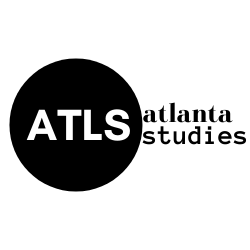Atlanta Studies is an open access, multidisciplinary digital publication that features work from the scholars, writers, artists, and activists who are writing the next chapters in our city’s story. Examining Atlanta from a wide range of perspectives (inside and outside of academia), we offer thoughtful analyses of the metro region’s past and present for a public audience. We keep a finger on the intellectual pulse of Atlanta, while finding innovative ways to communicate and collaborate. Our publication reaches a growing readership in the thousands of viewers each month.
We would like you to contribute to Atlanta Studies. Please email us at atlstudies@gmail.com with the subject heading “Submission [your last name, first initial]”. Following the guidelines below will help streamline your submission process.
Submission Guidelines
Atlanta Studies has a diverse readership, including those inside and outside academia. Our publication reaches scholars from across the academy, students, activists, planners and policy makers, religious leaders, and members of the general public. We take pride in our audience’s range, as well as in our reach beyond metro Atlanta; a third of our audience lives outside Georgia. Authors should keep this audience in mind when seeking publication in Atlanta Studies. First, our readers – diverse in age, education, and discipline – will not all know the terms and context related to the author’s research. Second, our national audience might not be aware of Atlanta-specific places and events. To reach this broad audience, please include all relevant background information, and write in a jargon-free, accessible style.
Atlanta Studies encourages submissions of articles, blog posts, and reviews. One of the benefits of publishing with Atlanta Studies in any format is your ability to include rich multimedia alongside your publication’s text. We highly encourage authors to suggest media to illustrate their arguments and, when able, we will work with authors to find and obtain permission to include relevant images, audio, and video.
Please review the information on formatting, style, and review process below before submitting.
Articles
Atlanta Studies publishes articles 3,000–5,000 words long that analyze a significant issue or history relating to the Atlanta metropolitan region. Articles feature the rigor and intellectual grounding typical of scholarly journal articles in other publications yet are written with a general audience in mind.
Blog Posts
Atlanta Studies publishes blog posts 500–1,500 words long that analyze a significant issue or history relating to the Atlanta metropolitan region. Blog posts frequently offer new insight into a current event, initiative, or project or summarize recent or forthcoming research for a public audience. Blog posts should include citations where relevant and may adopt a more conversational tone than articles.
Reviews
Atlanta Studies publishes reviews 1000–1,500 words long of recent books, films, television shows, digital projects, exhibitions, events, and other forms of art and scholarship that directly relate to Atlanta or engage issues pertinent to the city. Reviews should critically engage the work’s key arguments, assess its contribution to larger intellectual/artistic conversations, and convey the significance of the work to a multidisciplinary and public audience with interest in Atlanta. For reviews of works not explicitly about Atlanta, the reviewer should clearly explicate the relevance of the work to Atlanta.
Atlanta Studies solicits reviews of specific texts, but we also welcome unsolicited submissions. We recommend contacting our Managing Editor at atlstudies@gmail.com with any suggested or proposed review materials.
Atlanta Studies promotes all publications through our vibrant social media presence. We provide authors with reports detailing the readership for their published work, which typically includes thousands of views within a year of publication.
Atlanta Studies adopts the latest edition of The Chicago Manual of Style, notes and bibliography system, but we also have a few house rules and style preferences.
- Tone: Writing in Atlanta Studies avoids passive voice, nostalgia or cliché, essentialist depictions of people or places, mere editorializing, and discipline-specific article formats.
- Place names: Atlanta Studies prefers the term “City of Atlanta” to refer to the municipally bounded City of Atlanta and the terms “Atlanta metropolitan region” or “metro Atlanta” to refer to the broader metropolitan area. The term “Atlanta” may be used to refer to the idea of Atlanta or to refer to the city or region when the referent is clear from context. Atlanta Studies prefers “US” or “United States” rather than “American” or “America” for political or historical contexts.
- Punctuation: Atlanta Studies uses an en dash surrounded by spaces (” – “) to set off amplifying or explanatory elements in place of the em dash frequently used. (See Chicago, 6.83 and 6.85.)
For primarily textual submissions, please submit a Microsoft Word document (.docx, .doc) or rich text file (.rtf). Please send separate image, sound, and video files, even if the media should appear embedded in the text. Below is a listing of acceptable file types.
For all media files, please use the largest, highest quality version available.
Genre File Formats
Text .docx, .doc, .rtf
Image .png, .tiff, .jpg
Sound .wav, .aiff, .mp3
Video .mov, .avi, .mp4
As an open access journal, Atlanta Studies is available freely on the internet. One benefit to publishing with Atlanta Studies is that under our author agreement, authors retain copyright for their contributions, with publication rights granted to the journal. Third parties wishing to reproduce original content from Atlanta Studies not published under a Creative Commons license (see below) must:
- Seek permission from authors
- Acknowledge Atlanta Studies as the site of original publication
Atlanta Studies also offers our authors the option of distributing their new work published in the journal under the CC BY-NC-ND Creative Commons license. Under the CC BY-NC-ND (attribution, non-commercial, no derivatives) license, users may copy, distribute, display, or perform a work, but only for non-commercial purposes. However, users may not make derivative works, such as those “consisting of editorial revisions, annotations, elaborations, or other modifications which, as a whole, represent an original work of authorship.” Authors might choose this license if they wish to permit greater distribution of their work without permission than would be possible if retaining copyright, but still restrict commercial entities from republishing their scholarship, and prohibit all from making modifications to their work without permission.
Though Atlanta Studies is not a peer-reviewed journal, everything we publish nonetheless undergoes a rigorous review process by our editorial board and editorial staff. The journal offers prospective authors the opportunity to produce credible public-facing work in a timely manner while still undergoing a critical review process. Below we clarify the review processes for articles as opposed to other materials.
- Articles undergo rigorous review by two members of our editorial board, which includes experts on Atlanta from a wide variety of disciplines. Upon review they will recommend either acceptance, rejection or revision and resubmission. Revised and resubmitted articles will be reread by these two reviewers who will recommend either acceptance or rejection.
- Blog posts, book reviews and interviews undergo rigorous review by one editorial board member as well as by at least one member of our editorial staff. Readers typically offer recommendations for revision and are often able to work directly with authors toward a publication-ready version of the submission.
Editorial email address: atlstudies@gmail.com. Write to this address submit your work for consideration, or with general questions about the journal.
Please also feel free to contact these members of our editorial staff:
Ben Miller, Executive Editor (b.j.miller@emory.edu)
Tyler Tennant, Managing Editor and Web Developer (ttennan@emory.edu)



